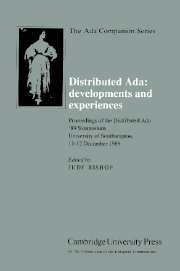 Distributed Ada: Developments and Experiences
Distributed Ada: Developments and Experiences Published online by Cambridge University Press: 13 October 2009
ABSTRACT
The Ada multi-tasking model is one in which tasks can run on separate processors and memory is either non-shared (local to one task), or shared (referenced by more than one task). It would therefore seem that mapping Ada onto a multi-processor architecture with both local and shared memory should be straightforward. This paper examines the difficulties in mapping Ada onto the IBM RP3 which is an example of such an architecture. In practice there are a number of difficult problems, the most significant of which is the inability to determine at compile time which variables are shared. The RP3 has a flexible shared memory architecture, and an important purpose of the Ada/RP3 project is to investigate possible models for implementation of Ada, with a view to determining whether modifications or enhancements of Ada are desirable to ensure optimal use of such architectures.
INTRODUCTION
The NYU Ada/Ed system consists of a front end and interpreter written entirely in C. This system is a direct descendant of the original SETL interpreter, and has been ported to a wide variety of machines [KS84].
Our current research involves porting Ada/Ed to the IBM RP3, an experimental multi-processor with shared memory [P87]. The front end is essentially unchanged, except for the addition of a set of pragmas described later, but the backend is being modified to interface with proprietary IBM code generating technology, and the runtime library is being rewritten to take advantage of the multi-processor architecture.
To save this book to your Kindle, first ensure [email protected] is added to your Approved Personal Document E-mail List under your Personal Document Settings on the Manage Your Content and Devices page of your Amazon account. Then enter the ‘name’ part of your Kindle email address below. Find out more about saving to your Kindle.
Note you can select to save to either the @free.kindle.com or @kindle.com variations. ‘@free.kindle.com’ emails are free but can only be saved to your device when it is connected to wi-fi. ‘@kindle.com’ emails can be delivered even when you are not connected to wi-fi, but note that service fees apply.
Find out more about the Kindle Personal Document Service.
To save content items to your account, please confirm that you agree to abide by our usage policies. If this is the first time you use this feature, you will be asked to authorise Cambridge Core to connect with your account. Find out more about saving content to Dropbox.
To save content items to your account, please confirm that you agree to abide by our usage policies. If this is the first time you use this feature, you will be asked to authorise Cambridge Core to connect with your account. Find out more about saving content to Google Drive.